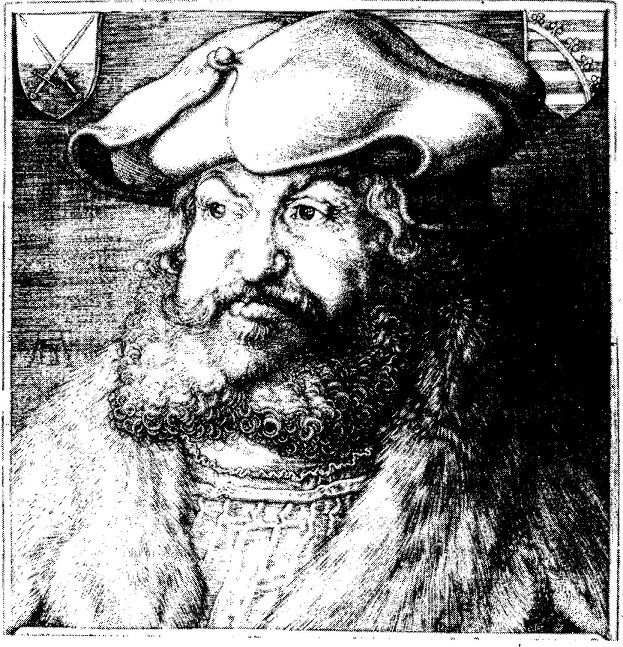
The powerful and influential Elector of Saxony who founded the university in Wittenberg where Martin Luther taught and who protected the latter from prosecution by Rome when the controversy broke open upon the publication of the Ninety-Five Theses.

As the eldest son, Friedrich succeeded his father as Elector of Saxony in 1486, and soon acquired the moniker 'the Wise' because of his reputation for justice and fair play. Though the grand-nephew of a former Emperor of the Holy Roman Empire, and a cousin and trusted advisor of the current emperor, Maximilian I, it was his abilities that were so recognized that, by 1500, he was elected president of the Reichregiment, a newly formed council of the regency. By 1519 he was eligible to stand for election as Emperor of the Holy Roman Empire though he refused the candidacy. Influenced by the Renaissance and Humanist mindset, he did much to promote its influence in his court, in regular correspondence with Erasmus, and where famous artists like Albrecht Dürer and Lucas Cranach were patronized. In 1505 he founded the university in Wittenberg where Andreas Karlstadt, Martin Luther, and Philipp Melanchthon were later to become teachers.
Friedrich never married; that, however, did not stop him from leaving behind a string of illegitimate children. Though recognizing the need for reforms in the Church he remained a faithful Catholic. What Luther did cost him dearly, especially in financial terms. Because of Luther's reformation, his Castle Church—with its more than five thousand relics—lost its status as a pilgrimage destination, and its own indulgences that were offered for sale. Once the university itself became a center of the Reformation, the rich patrons who supported their Catholic students there withdrew them, and the money they would have paid for them. But when Luther came under the wrath of Rome, Friedrich stood steadfast in his protection of his ward; he was probably instrumental in Luther's 'kidnap' after the Diet of Worms and subsequent sequestration in Wartburg Castle. They may have met before Luther's trouble with Rome began but once the controversy started Friedrich always acted, with regards to Luther, through his chaplain, George Spalatin. Though there must have been reasons of self-interest involved, it is certain that Friedrich also ventured such risk for reasons of fair play. Consistently he insisted that Rome had never provided good enough reasons why Luther should recant. In a letter to Cardinal Cajetan on 18 December 1518, e.g., he says,
There are learned men in the universities who hold that his [Luther's] teaching has not been shown to be unjust, unchristian or heretical. The few who think so are jealous of his attainments. If we understood his doctrine to be impious or untenable, we would not defend it. Our whole purpose is to fulfil the office of a Christian prince."
Despite his support for Luther, Friedrich remained faithful to the Catholic Church, though as he came to the end of his life, he broke with the Catholic ruling of the time and decided to take communion in two kinds. Luther preached at his funeral, praising him for what he had done for the gospel of our Lord Jesus Christ. He was a man worthy of our praise; if he had not acted at great cost to himself the way he did towards Luther, the Reformation would have taken a very different course.

©ALBERITH
090221lch